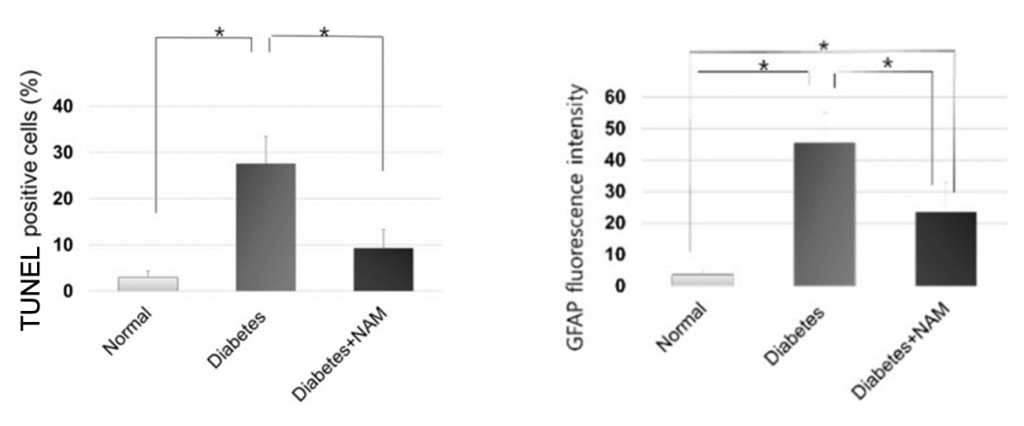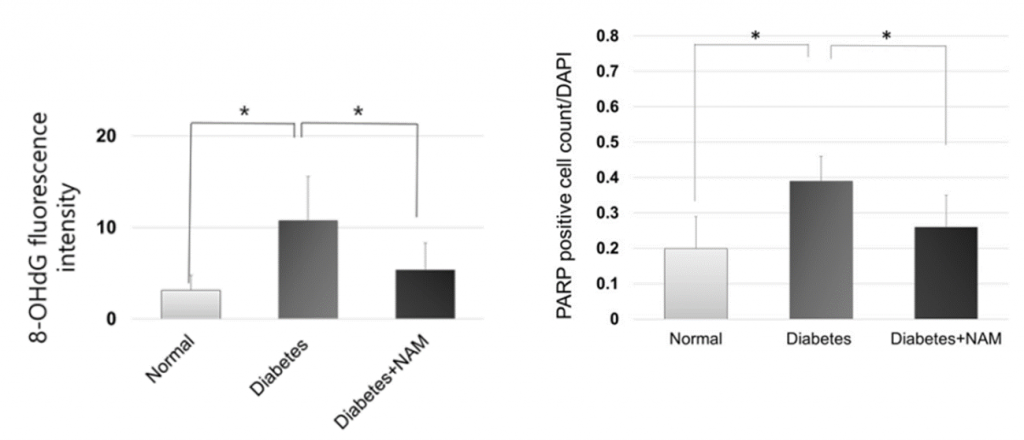Key Points:
- Vitamin B3 (nicotinamide) treatment reduces cell death and injury in the retinas of rats modeling diabetes.
- Treatment with nicotinamide enhances DNA repair in the retinas of diabetic rats.
Among the myriad of risks associated with diabetes, one that severely impacts life quality is blindness, which stems from the deterioration of the retina – eye tissue that helps transduce light into vision. The retinas of diabetic patients are highly susceptible to DNA damage. Thus, finding ways to stimulate DNA repair is essential to thwart diabetes-induced blindness.
As reported in Nutrients, researchers from The Catholic University of Korea examined vitamin B3, also known as nicotinamide, to test its effects on retinal degeneration in rats modeling diabetes. Nicotinamide is a precursor to nicotinamide adenine dinucleotide (NAD+), a molecule that fuels DNA repair. Park and colleagues found that diabetic retinas exhibited increased retinal cell death (apoptosis), which was reversed by treatment with nicotinamide. What’s more, nicotinamide treatment reduced DNA damage by alleviating oxidative stress – an age-related phenomenon that causes damage to cellular components, including DNA.
Nicotinamide Protects Against Cell Death
The excessive cellular damage caused by oxidative stress in diabetes inevitably leads to cell death, which deteriorates the retina and triggers vision impairment, and blindness. Park and colleagues showed that chemically-inducing diabetes in rats leads to high levels of retinal cell death. However, dissolving nicotinamide (500 mg/kg/day) in the drinking water of the diabetic rats reduced this cell death. Furthermore, retinal injury, as measured by a protein called GFAP, was also reduced by nicotinamide treatment. Taken together, these findings demonstrate that nicotinamide can protect against diabetes-induced retinal deterioration.

Nicotinamide Reduces DNA Damage
Oxidative stress is caused by excessive levels of reactive oxygen species (ROS), which cause direct damage to DNA, contributing to diabetic retinopathy (retina disease). When DNA is damaged, an NAD+-dependent enzyme called PARP1 is usually recruited to repair the damaged DNA. However, under extreme conditions caused by excessive ROS, PARP1 becomes overactivated and subsequently depletes NAD+, resulting in impaired DNA repair and further cell death.
Given that nicotinamide replenishes NAD+, Park and colleagues examined whether nicotinamide could enhance DNA repair. Not only did treatment with nicotinamide reverse oxidative DNA damage, but it also prevented PARP1 activity from skyrocketing. These findings could explain why rats treated with nicotinamide exhibited less retinal cell death. Overall, the findings suggest that nicotinamide exerts protective effects against retinal degeneration by improving the DNA repair response and reducing oxidative stress.

Should Diabetics Take Nicotinamide To Prevent Blindness?
According to the CDC, around 10% of diabetic patients over the age of 45 experience diabetic retinopathy. Symptoms of diabetic retinopathy are also seen in conditions like glaucoma and age-related macular degeneration. Previous research has shown that nicotinamide protects the retina in glaucoma animal models. Furthermore, another NAD+ boosting molecule called nicotinamide mononucleotide (NMN) has been shown to protect against age-related macular degeneration, further highlighting nicotinamide’s NAD+ boosting potential to treat multiple diseases linked to visual impairment. That being said, clinical trials are required to fully assess human translatability.